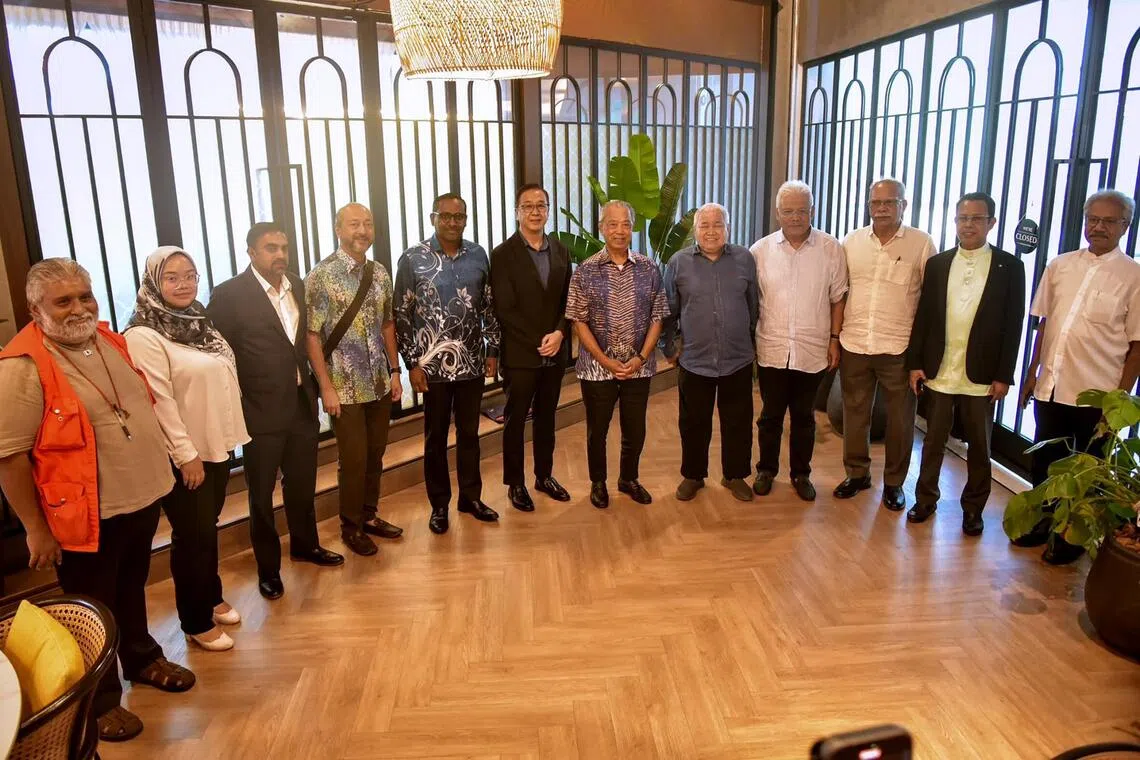Malaysia’s ex-PM Muhyiddin fights for relevance via loose opposition bloc amid dissent in Bersatu
Sign up now: Get ST's newsletters delivered to your inbox

The informal tea gathering with opposition parties attended by Mr Muhyiddin (centre).
PHOTO: MUHYIDDIN YASSIN / FACEBOOK
Follow topic:
- The "big tent" that loosely groups together 12 opposition parties aims to portray a multi-ethnic Perikatan Nasional (PN) to rival PM Anwar Ibrahim's unity government.
- Observers say the loose pact is a “decorative” move, as tensions within Bersatu play out.
- The loose coalition's impact is questionable due to the parties' lack of political heft and ideological divides.
AI generated
KUALA LUMPUR – Denied another chance to lead the federal government and quickly losing relevance as the opposition, former ruling Parti Pribumi Bersatu Malaysia recently proposed a loose coalition to unite 12 parties currently not in the government.
With party president Muhyiddin Yassin on shaky political ground of late, the loose pact has been dismissed as largely symbolic as most of the groups involved have little electoral weight, observers say.
Tan Sri Muhyiddin, who is also chairman of the opposition Perikatan Nasional (PN) alliance – whose leading members are Malay-based Bersatu and Parti Islam SeMalaysia (PAS) – has said the loose coalition would focus on pressing concerns faced by the public such as rising living costs, which the current Anwar administration has failed to address.
Political scientist Professor Wong Chin Huat called it a “decorative” move by PN to portray itself as a multi-ethnic coalition to rival Prime Minister Anwar Ibrahim’s unity government, raising questions over its viability as Malaysia’s main opposition force.
“The PN’s ‘big tent’ in 2025 includes parties that are insignificant or little known... The idea is (merely) decorative, to show that PN is multi-ethnic in order to allay fears among non-Muslims and their determination to vote against PN,” the Sunway University professor told The Straits Times.
The so-called “big tent” idea was mooted ahead of Bersatu’s annual general assembly in September.
In a rare public display of dissent against Mr Muhyiddin by party members, a commotion broke out during his opening speech on Sept 6, with calls urging the party chief to “step down”. Mr Muhyiddin even claimed that some were collecting signatures to topple him as president, a move he criticised as unconstitutional in the party.
Talks of the broader coalition started on July 18, after Mr Muhyiddin announced that he had hosted a lunch with leaders from various parties to discuss a united front. Representatives from main ally and PN component PAS were absent.
A month later, on Aug 18, Mr Muhyiddin said that the parties had agreed
As tensions within Bersatu played out, the former prime minister forged ahead, telling party members at the general assembly on Sept 6: “This coalition will indirectly strengthen PN’s role in providing checks and balances as the opposition. I am confident that this new political model is more inclusive, stable, and easier for the people to accept.”
Mr Muhyiddin became Malaysia’s eighth prime minister in March 2020, following the collapse of Tun Dr Mahathir Mohamad’s coalition government, before stepping down from the top job in August 2021 after losing parliamentary support.
Bersatu’s internal elections in 2024 saw Mr Muhyiddin retaining his presidency unopposed, in a term that will run until 2027. Malaysia’s next general election is due by early 2028 but could be held earlier.
In the 2022 general election, opposition PN was estimated to secure 54 per cent of the Malay vote
“This (loose pact) is an association of opposition parties based on a common cause, which proves that Bersatu is an inclusive party capable of setting aside differences to fight for a shared goal,” Bersatu information chief Tun Faisal Ismail Aziz told ST.
Yet it is unlikely that the new loose coalition will give Bersatu and Mr Muhyiddin, and by extension PN, any increased political clout, observers say.
Of the 12 parties under the “big tent,” only the urban youth-centric Malaysian United Democratic Alliance (Muda) holds one seat each in the federal and state legislatures. Others with some political cachet include Dr Mahathir’s Parti Pejuang Tanahair (which he founded in 2020 and left in 2023).
But two parties are considered hardline: the pro-Malay Parti Bumiputera Perkasa Malaysia, and the Islamist Barisan Jemaah Islamiah SeMalaysia.
This is compounded by how some of the parties remain non-committal to the “big tent” concept despite having attended the two meetings in July and August, and denying that the loose coalition is in any way an electoral pact of sorts.
Muda’s acting president Amira Aisya Abdul Aziz said in a statement on July 19 that it has not committed to the loose coalition, and “no formal decision has been made regarding any political cooperation at this stage.”
Professor P. Ramasamy, who leads Indian-based United Rights of the Malaysian Party, stressed that being part of the “big tent” does not mean his party has aligned itself formally with PN. But it’s the best way to establish a common platform against the ruling government while maintaining independence in its efforts to attract Indian voter support for PN.
“I will be the first to oppose if PN raises issues that affect minority rights. But we have made some breakthroughs in garnering Indian support by forming state liaison committees in seven states,” he told ST.
Professor Kartini Aboo Talib at Universiti Kebangsaan Malaysia’s Institute of Ethnic Studies views the loose coalition as simply a tactical move by Bersatu to hold the government accountable and potentially avoid multi-cornered contests in future elections.
Furthermore, age is against Mr Muhyiddin, who is 78, as he positions himself as a viable candidate to be the prime minister for a second time, said Prof Kartini.
“His role as architect of the (loose) coalition gives him strategic clout. Still, critics may argue that fresh leadership is needed to galvanise younger voters and present a credible alternative to PH-BN,” she said.


